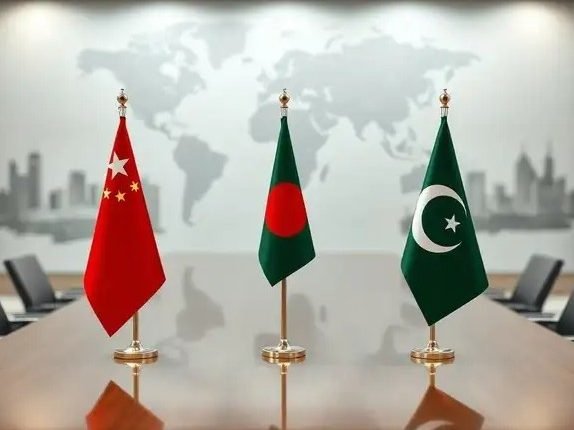Bangladesh Downplays China-Pakistan Trilateral Amid Concerns of Anti-India Axis
Dhaka Seeks to Rebuild Ties with India Amid Tense Diplomatic Climate
Bangladesh’s caretaker government, led by Chief Adviser Muhammad Yunus, has sought to defuse growing concerns in India over a perceived emerging alliance between China, Pakistan, and Bangladesh. Recent media reports suggesting the formation of an anti-India front following a trilateral meeting in Kunming have been dismissed by Bangladeshi officials as misinterpretations.
“Do Not Read Beyond It”: Bangladesh Clarifies Kunming Meeting
Bangladesh’s Adviser on Foreign Affairs, Md. Touhid Hossain, addressed the media on Thursday to clarify the nature of the trilateral meeting held on June 19 in Kunming, China. The meeting took place on the sidelines of the 9th China-South Asia Exposition and the 6th China-South Asia Cooperation Forum.
“There is nothing political about the meeting,” said Hossain. “Do not read meaning beyond it. I assure you it was not done to target our neighbour, India.”
Focus on Trade and Connectivity, Not Politics
Bangladesh’s Acting Foreign Secretary, Ruhul Alam Siddique, emphasized that the meeting primarily focused on regional cooperation in areas such as trade, agriculture, and digital infrastructure. He confirmed that it was the first in-person meeting between the three countries since Bangladesh’s political transition in February, and the second engagement overall in recent months.
Participants included Chinese Vice Foreign Minister Sun Weidong, Pakistan’s Additional Foreign Secretary Imran Ahmed Siddiqui, and Pakistan’s Foreign Secretary Amna Baloch, who joined virtually. China described the engagement as a move to strengthen friendly ties, while Pakistan hailed it as the beginning of a “new bloc.”
India Reacts with Caution Amid Political Shift in Dhaka
The meeting prompted speculation in Indian media about a potential “China-Pakistan-Bangladesh axis” aimed at India. Regional commentators raised concerns about growing hostilities and the possibility of a multi-front diplomatic challenge for New Delhi.
Following the meeting, Indian media outlet India.com warned of a possible “3.5 front war” scenario involving China, Pakistan, and Bangladesh. In response, Hossain stated that the meeting was “not a big deal” and mainly about connectivity and development issues.
Post-Hasina Era and Worsening Indo-Bangla Relations
Tensions between India and Bangladesh have grown since the ousting of former Prime Minister Sheikh Hasina in August 2024. Hasina, who shared close ties with New Delhi, fled to India where she now remains in exile. Her departure has contributed to strained bilateral relations, as the new administration appears to be shifting its foreign policy closer to China.
Chief Adviser Muhammad Yunus has faced criticism for cozying up to Beijing. His March 2025 visit to China, during which he offered Bangladesh as a gateway for Chinese economic access to India’s Northeast, drew strong reactions from Indian leaders. Furthermore, Yunus’ failed attempt to meet Prime Minister Narendra Modi during the BIMSTEC summit in Bangkok highlighted the growing diplomatic rift.
Bangladesh Signals Openness to India-Nepal Trilateral
Despite the shifting geopolitical landscape, Dhaka has indicated a willingness to engage constructively with India. Hossain stated that Bangladesh is open to participating in any regional cooperation initiatives involving India, including potential trilateral meetings with Nepal.
“If India and Nepal propose to hold a trilateral meeting with Bangladesh, we will not be against it,” he added, suggesting Dhaka’s desire to avoid being seen as aligning against India.
Denials of Joint Working Group Participation
Recent reports that Bangladesh has agreed to join a China-Pakistan joint working group on connectivity were also dismissed. The denials are seen as a strategic move by Dhaka to balance its relations in the region and avoid the perception of aligning too closely with any one bloc, especially amid growing scrutiny from New Delhi.
Looking Ahead: Elections and Diplomatic Balancing
With general elections in Bangladesh scheduled for 2026, the caretaker government is under pressure to stabilize internal politics and maintain regional balance. A recalibration of foreign policy that includes outreach to India appears to be underway, as the interim administration attempts to navigate both domestic and international challenges.



Comments are closed.